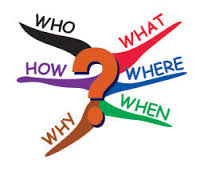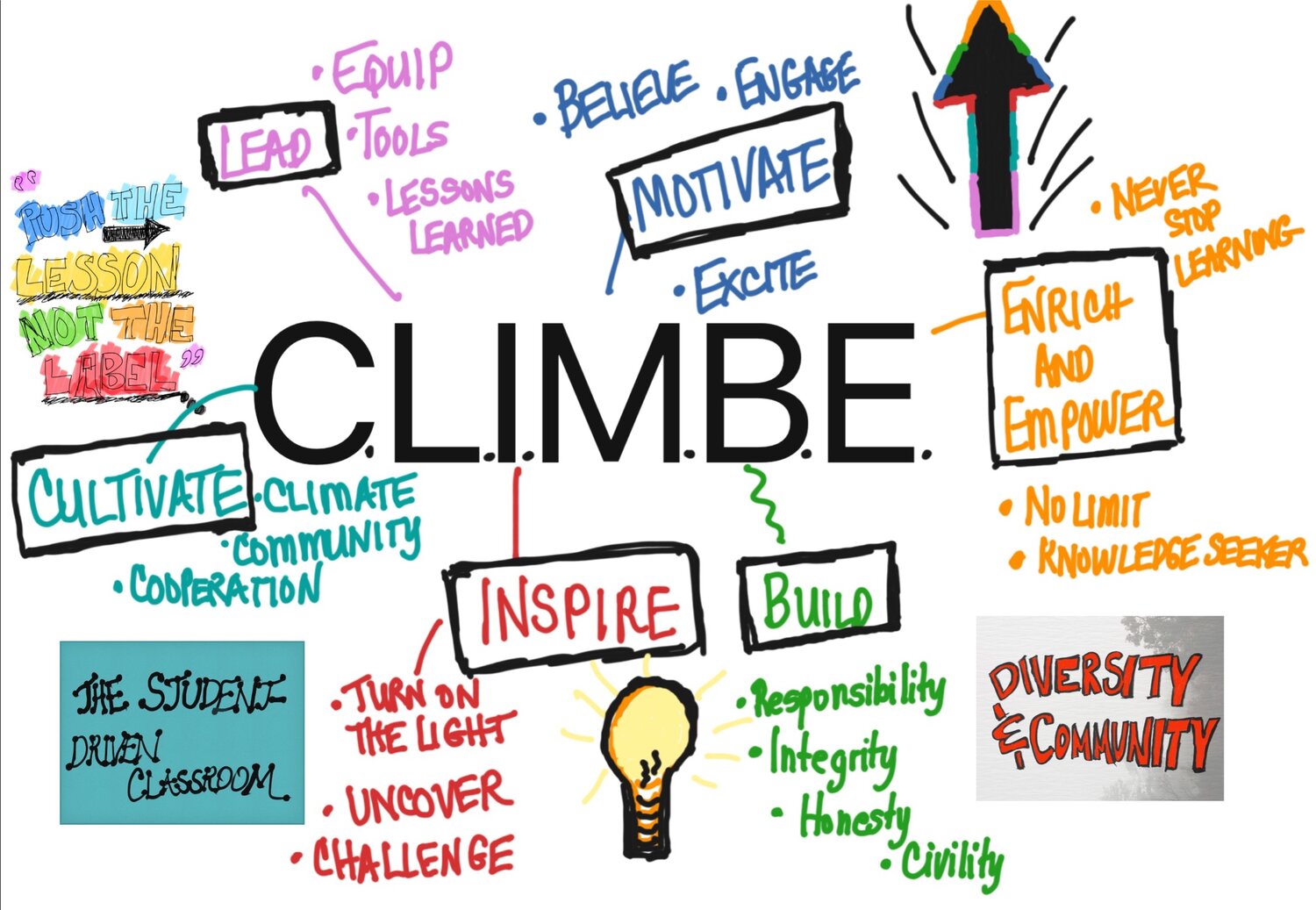Going the Extra Mile
 I am so grateful that I have been able to complete yet another productive year of teaching and learning with my students. As this is certainly not my first rodeo, I understand that in this day and age, students experience so much pressure to succeed and do well but often lack the proper support systems with which to manage the challenges that they face from day to day. What does that look like? It could be the girl or boy, who has both parents at home, but needs extra support that may or may not already be provided to them. It might be that teenage kid that is the product of a single-parent home and the parent is doing all that they can to support them. It might be a child who does not have a very good relationship with his or her parents and is looking for a model or a mentor. It may be that child that likes what they see in you, and seeks to emulate who you are and what you do, but lacks the steps necessary or the knowledge necessary with which to take those steps. It might be the child who has both parents in the picture, but living in two different homes. Lastly, it could be that well-supported child, with both parents providing aid to him or her, pushing them to do their very best, but the child still looks to you to be their guide. Whichever the experience, it is never a bad thing for an educator to go the extra mile. This is what I will discuss here, with anecdotal input regarding the unrelenting need that called my name this year.
I am so grateful that I have been able to complete yet another productive year of teaching and learning with my students. As this is certainly not my first rodeo, I understand that in this day and age, students experience so much pressure to succeed and do well but often lack the proper support systems with which to manage the challenges that they face from day to day. What does that look like? It could be the girl or boy, who has both parents at home, but needs extra support that may or may not already be provided to them. It might be that teenage kid that is the product of a single-parent home and the parent is doing all that they can to support them. It might be a child who does not have a very good relationship with his or her parents and is looking for a model or a mentor. It may be that child that likes what they see in you, and seeks to emulate who you are and what you do, but lacks the steps necessary or the knowledge necessary with which to take those steps. It might be the child who has both parents in the picture, but living in two different homes. Lastly, it could be that well-supported child, with both parents providing aid to him or her, pushing them to do their very best, but the child still looks to you to be their guide. Whichever the experience, it is never a bad thing for an educator to go the extra mile. This is what I will discuss here, with anecdotal input regarding the unrelenting need that called my name this year.
Have you heard the phrase "To whom much is given, much will be required?" It is one thing to quote this but it is another thing altogether to see this idea pan out right before your eyes. Let's just say that I wear many hats at the school where I am currently an educator and next year, I will take add a few more to the hat rack. I am in my fourth year at this school, and clearly arriving at the said school was no coincidence. It might be the view of some that teachers are in their profession for the benefits, summers and holidays off and to collect a paycheck. A generalization at best, teachers are not always given the praise for the admirable job that they do. It is one fraught with many challenges from year to year or even from day to day, but some intrinsic motivation or voice compels the educator not only to answer the call to teach and facilitate learning, but to go back every day with a renewed passion to bring hope, light, strength and empowerment to the students he or she teaches to be the absolute best that they can be. There are no limits, except for the ones set forth in the mind of the child, which could be as a result of what he or she experiences, or doesn't experience.
So, what does it mean to "go the extra mile?" The idiomatic phrase could encompass a variety of different tools, strategies, tricks, or tactics demonstrated by the educator to bridge gaps, support students in their learning, bring hope or light to a challenging situation or simply put a smile on a student's face. This is where I would like to mention the first story, of which I shall not mention any names specifically. Last school year, I had a student, who we shall call Student A, that came to me with challenges in the Language Arts content area, and I immediately begin to work with the student to grow them to a level that was consistent with grade level expectations. Things were progressing nicely but as the year went on, I began to learn of other challenges faced by the student that may have placed limits on learning. I decided to get involved and act as another support system for the student, who would hopefully come to me when help was needed, and to make some good of a difficult situation. As a result of the extra time that was spent with this student, the demonstration of care and concern and the establishment of an unofficial mentoring relationship with the student, there was a complete turnaround. Not only was there an increased motivation on the part of the student, the student academically began to excel, and while not completely out of the woods, was making great strides to get there. The parent was thrilled with the change in the behavior because I simply took time. I found myself attending extracurricular activities to support the student as well as devising ways to interact during the school day. This was a win, because I decided to go the extra mile.
I must say that I love diversity and all that it brings to any situation. It is great to learn from others and our experiences and viewpoints are all so varied and meaningful. That said, I have noticed that students tend to look for those that they feel they can relate to at school. That may mean that girls will cling to warm, inviting female teachers or that minority students may look for minority teacher representation within the school. This is not division in any way, but simply their search for a model to pattern themselves after. The second scenario I will share is another student who I taught, but then returned to me in a different capacity for support. This student was dealing with the challenge of balancing life with mom and dad, who lived in separate home situations. In addition, the student was on a search to understand or learn who they really were. The student in question had been having behavioral challenges at school, because he was trying to fit in, balance home life, school life, and at the same time, facing the quest to identify himself. I stepped up the plate in this situation also. I listened to him, allowed him to come to my room during times of need and even to take a break from the norm. The student became very comfortable with coming to me when a talk was needed, or when help was desired on an assignment, a speech, or talking through a problem orally. I have taken time outside of school to interact with the student in a mentoring capacity due to the nature of the need and the expressed interest by the parents of the student to form this mentoring relationship. How has it helped you ask? Well, not only have I been labeled as "uncle" now, I receive hugs almost every day or the student is sure to come and greet me daily. In addition, his achievement has skyrocketed and the students I currently teach are able to look up to the student in question. Another win here for going the extra mile. I could have not taken the time, but consider how that may have negatively impacted the student, who, might I add is very intelligent with tremendous potential.
Being an educator is not easy for obvious reasons, therefore being a passionate educator that is willing to go the extra mile is not as common as it should be. Consider how things might change for all parties involved if the student(s) felt supported. There is much more to be gained from such an experience than what may be lost.

Go the extra mile. It might just light the fire in a student that is not easily extinguished.
I'd love to hear your thoughts about this blog. Please feel free to comment or contact me on twitter, @dene_gainey.
[contact-form][contact-field label="Name" type="name" required="1" /][contact-field label="Email" type="email" required="1" /][contact-field label="Website" type="url" /][contact-field label="Comment" type="textarea" required="1" /][/contact-form]
Student Empowerment to LEARN
[wpvideo thjeIaGu]
This is what happens when students engage in the content area and synthesize that knowledge with technology. Student experiments with the #tellagami app on Esperanza Rising by Pam Munoz Ryan.
The Power of Quotes (Words)
Communication is a social skill that is integral to the existence of any individual. How we communicate is in part, determined by the bank of knowledge, in this case, the depth of vocabulary that we have. Is the point to use language that is above another's capacity to understand? Absolutely not. However, there is a certain power in the words one chooses articulate his or her intentions. There is power in what you say. In fact, there is power in saying what someone else has said.
One of the key pieces of my classroom is writing, one form of communication that I practice and dialogue with students about all year. Though sometimes it is considered a cumbersome task by students, it  is a necessary life skill, to be able to write, and for a variety of purposes. Expository or nonfiction writing is writing that reflects what has happened, or might explain the rationale or history or reason(s) for something occurring. Therefore, it is necessary to learn how to explain and elaborate. Also, since this is not a narrative form, often lacking the flair of figurative language, it is necessary for the writer to develop this form of writing as well, and using quotes is a great and powerful way to do so.
is a necessary life skill, to be able to write, and for a variety of purposes. Expository or nonfiction writing is writing that reflects what has happened, or might explain the rationale or history or reason(s) for something occurring. Therefore, it is necessary to learn how to explain and elaborate. Also, since this is not a narrative form, often lacking the flair of figurative language, it is necessary for the writer to develop this form of writing as well, and using quotes is a great and powerful way to do so.
Dissecting quotes and understanding the meaning behind them aids students in determining whether a quote might be relevant in writing and how it can be used to engage the reader and/or listener and solidify the intended message. Consider the quote below.
"Words are like paint in which the writer becomes the artist and creates a masterpiece.” – Dene Gainey
In that quote, words are being compared to paint, and metaphorically, writing is being compared to artwork. In this way, the writer can now form an explanation to support how this statement applies to his or her writing, furthering the explanation and engaging the audience, prompting them to think as they read. Quotes are powerful and modeling this power for students will enable them to not only notice the power of quotes (words) but begin to manipulate words themselves.
The C.L.I.M.B.E. Philosophy
As a tree "climbs" and produces fruit, so does this philosophy. You might be wondering, what is the C.L.I.M.B.E. philosophy and how does it pertain to education? I firmly believe that there is a need for role models, mentors and individuals to make a difference in their area of influence. How then, does this philosophy apply? This is an idea that I have been developing over some time. Students must have insight, wisdom and guidance for the future of society and them individually. It is important that the knowledge and experience that one has is shared with others, otherwise it is simply knowledge that you will leave this world with. I am a lifelong learner.
Twitter Use in Education
You may be asking yourself how Twitter is educationally relevant. Some view Twitter simply as a networking opportunity and perhaps others deem it as a social media influence. Educators all across the globe use Twitter every day to engage in meaningful and relevant discourse regarding tools, self and classroom development, innovation, encouragement and developing a strong network of educators that can and do interact in an ongoing manner.
The Power in Empowerment
Students truly should be the focus in classrooms today. What does that look like? Doda (2011) suggests that there are four steps necessary in order to make student empowerment a reality: focusing on classroom community, thinking about learning, asking more and talking less, and finally offering options or choices. I happen to agree that classroom community is a necessary component of a student-centered or student-empowered classroom as well as the establishment of the remaining three principles indicated by Doda. Classroom Community
What is a community? What is classroom community? What is the relevance of both of these ideas? Well a community might be defined as a group of individuals that "commune" or interact in a geographical area, for the betterment of each other, to provide both intellectual and social stimulation for all within the community. Classroom community therefore is a group of peers that interact with each other to develop bonds and learning relationships. Students can gain knowledge from each other as well as the facilitator or educator. Within this type of environment, one can learn social constructs, develop or extend their knowledge, in an environment that is not restricted. Also, students may determine the rules or agreements necessarily in order for all students to engage in meaningful ways, such as listening to each other and not talking while others are doing so. Not only is this empowering, but if students form the rules, they would more likely be willing to abide by rules they were helpful in putting into place.
Think about Learning
Is this not already a common practice? Perhaps not. Perhaps the idea of thinking about learning is not as intentional as it needs to be. I firmly believe that learning is solidified when you take time to think about it. Moreover, I believe that learning even occurs when you take the time to reflect on it. Intentional is the operative term here, because without the intentional act, then one must wonder if there was any established purpose for the activity being taught or learned from the beginning. Through the reflection process, ideas are cemented in the mind, and growth can take place from this point (Du Bourg, 2016). So as one establishes or draws conclusions on the day, for example, what's necessary to do can be determined (Du Bourg, 2016).
Ask More, Talk Less
The more I think about this aspect of student empowerment, the more I question why it isn't a more known principle. What is the benefit of asking more and talking less? I believe that this is strongly connected to the construction of knowledge, analysis and synthesis. It also identifies an individual as a learner, rather than one who knows it all. Developing or cultivating a learner-centered environment should include the freedom to inquire or investigate or question. Questioning is a powerful reading strategy that helps to focus a reader on what they know and do not know. In addition, based on the questions asked, the student can begin to seek the answer, through continued investigation and focused intent. I strongly believe that if students can be motivated to seek after knowledge, they will not only find it (or determine gaps in current understanding) but create a perpetual desire to learn, build and grow.
Offer Choices
I teach a variety of gifted students in the classroom and one of the most important considerations that an educator can make in the classroom is differentiation or offering students choices. Why is this important to do? "When students can choose where they sit, the books they read, the topics they investigate, the ideas they write about, or the project formats they find appealing, they become more invested in their own learning." (Doda, 2011, p. 16). This does not mean that students are not provided with structure, but within a certain domain of knowledge, or a specific topic or subject matter, students can be provided with a choice on how to ascertain or develop their knowledge. Doda (2011) identifies that this demonstrates the faith we should have in our students and moreover, students begin to make good of that faith and end in long-lasting learning experiences.
Concluding Thoughts
If the goal is to develop the intellect and social maturity of the individuals in which we teach, then empowerment is the way. Empowerment is multifaceted, as students gain much more from it than can be gained from lecturing daily, or limiting the classroom experience to only written assignments. Empowerment is free-flowing, meaning that the educator has the responsibility to gauge the abilities of the student, and provide meaningful learning experiences that are tailored to the students in the classroom. This may change from year to year based on the students one receives. Nevertheless, just as the students may change, so should our practices. As we work to empower ourselves as educators, through the development of practice, leaving our comfort zones and building channels by which we can learn, we can empower students to do the same.
 It takes a spark to create a fiery passion to seek after knowledge. Be the spark.
It takes a spark to create a fiery passion to seek after knowledge. Be the spark.
Doda, N. M. (2011). THE POWER OF EMPOWERMENT: Having faith in students. The Education Digest, 77(3), 14-17. Retrieved from http://search.proquest.com/docview/900869086?accountid=458
Du Bourg, B. (2016). THE POWER OF DAILY REFLECTION. Accountancy SA, , 54-55. Retrieved from http://search.proquest.com/docview/1749627737?accountid=458


